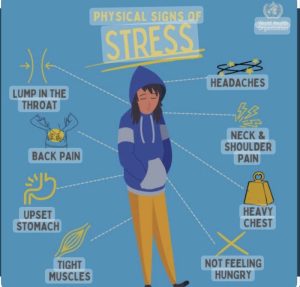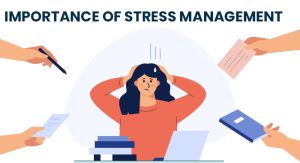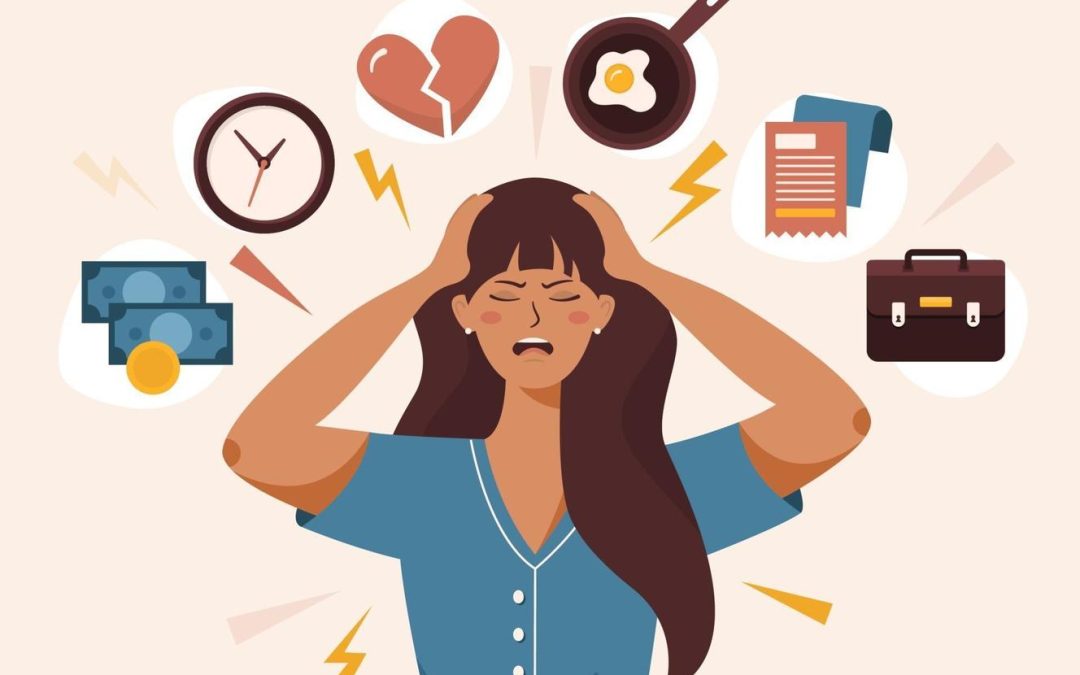Stress Reduction Tips
Stress is a feeling of emotional and physical tension. It can come from any event or thought that makes you feel frustrated, angry, or nervous. Like for example, sometimes we are so stressed about our academics or other activities that swe are unable to manage the tasks that how we end up being so much stressed. Stress is our body’s reaction to a challenge or demand. Stress can be positive, such as when it helps you avoid danger or meet a deadline.
Stress is an unavoidable part of life, but how we manage it can make all the difference. Whether you’re a student juggling assignments, a professional dealing with deadlines, or just navigating everyday challenges, demands. It can be triggered by work, studies, relationships, or unexpected situations. While short-term stress can boost focus and motivation, prolonged stress negatively affects mental and physical health.
Symptoms of stress
Stress can affect both the mind and body. Here are some common symptoms:
Physical Symptoms:
- Headaches or muscle tension

- Fatigue or low energy
- Rapid heartbeat or chest pain
- Upset stomach or digestive issues
- Difficulty sleeping (insomnia)
- Changes in appetite (overeating or loss of appetite)
Emotional Symptoms:
- Feeling overwhelmed or anxious
- Irritability or mood swings
- Difficulty concentrating
- Increased feelings of frustration or sadness
- Lack of motivation
Behavioral Symptoms:
- Procrastination or avoiding responsibilities
- Nail biting, fidgeting, or other nervous habits
- Social withdrawal
- Increased use of alcohol, caffeine, or smoking to cope
Effects on Mental Health:
- Anxiety and depression
- Irritability and mood swings
- Difficulty concentrating and memory problems
- Sleep disturbances
Effects on Physical Health:
- Headaches and muscle tension
- Increased heart rate and high blood pressure
- Weakened immune system
- Digestive issues
However, finding ways to reduce stress is essential for both mental and physical well-being. There are many common stress reduction tips but here are some simple and effective stress reduction tips that can help you feel calmer and more in control.
1. Practice Deep Breathing
Breathing exercises are one of the quickest ways to reduce stress. A simple technique like the 4-7-8 breathing method (inhale for 4 seconds, hold for 7 seconds, exhale for 8 seconds) can calm your nervous system and bring instant relaxation.
2. Stay Physically Active
Exercise releases endorphins, which are natural stress relievers. Even a 10-minute walk outside can boost your mood and energy levels. If you enjoy structured workouts, activities like yoga, jogging, or dancing can help relieve tension.
3. Organize Your Tasks
Feeling overwhelmed? Break tasks into smaller steps and prioritize them. Using a planner or to-do list can help you stay on track and reduce anxiety about unfinished work. The Pomodoro Technique (working for 25 minutes, then taking a 5-minute break) is a great way to stay productive without feeling drained.
4. Get Enough Sleep
Lack of sleep increases stress levels and affects focus. Aim for 7-9 hours of sleep per night. Try setting a bedtime routine, avoiding screens before sleep, and keeping your room dark and quiet for better rest.
5. Connect with Others
Talking to someone you trust—whether it’s a friend, family member, or mentor—can ease stress. Sometimes, just sharing your feelings makes a big difference. Social support plays a crucial role in managing stress effectively.
6. Practice Mindfulness & Meditation
Mindfulness means staying present in the moment rather than worrying about the past or future. Even 5-10 minutes of meditation daily can improve focus, reduce stress, and enhance emotional well-being. Try guided meditation apps or simple breathing exercises.

Importance of Stress Management
Better Well-Being:
Increasing your overall health is largely dependent on effective stress management. It assists people in reducing their risk of mental health conditions such as depression and anxiety. By lowering the risk of stress-related illnesses like high blood pressure or heart disease, it also improves physical health
Enhanced Performance:
High levels of stress can have a negative impact on our performance. By putting stress management strategies into practice, people can improve their ability to concentrate, focus, and make decisions. Consequently, this leads to increased productivity in a variety of spheres of life, including personal pursuits, employment, and education.
Healthier connections:
Stress can cause tension in friendships, family ties, and professional connections. By reducing conflict and enhancing communication, people can cultivate healthier relationships through efficient stress management. It makes it possible for people to handle difficult circumstances with more understanding and empathy, which eventually improves the general caliber of their relationships.
Increased Resilience:
People who control their stress are better able to overcome the many obstacles and disappointments that come with life. Effective coping strategies help people get through challenging circumstances more skillfully. When dealing with unforeseen life events or significant upheavals, this resilience becomes especially beneficial.
Conclusion
Although stress cannot be avoided, it can be skillfully managed to improve performance, resilience, relationships, and mental and physical health. We may deal with difficulties more skillfully and live balanced, satisfying lives by implementing good coping mechanisms and placing a high priority on self-care we can reduce the stress.

